The Journal
I get “The Journal” monthly, the Jim Visser published magazine that appears to be the sole remaining print manufactured housing periodical. Others, including the much beloved Manufactured Housing Merchandiser, dropped by the wayside in the recent past, as advertising support fell off. Take HUD Code home shipments from 372,800 in 1998, and let them free-fall to some 50,000 in 2010, and that 86% drop annihilated much of an entire industry. We see the results about as everywhere.
I read The Journal regularly, reading some articles carefully and skimming others of less interest to me, but I look at all of them. Note that all of the writers therein are either executives at MH trade associations, or consultants. The tradeoff for the publication is a plentiful supply of written material for free, which they sandwich around their advertising. The writers, mostly consultants, get no pay but are happy to write the pieces to highlight their acumen in their area of expertise, sometimes leading to paid consulting assignments.
We also get some “infomercials” from paid advertisers. They buy an ad and the periodical allows them to write a “puff piece,” often nothing more than a glorified press release. No worries mate, The Journal is not the Wall Street Journal and no one expects it to be.
All the materials therein provide information, which is what advertising is meant to do. The reason Jack uses Enzyte after playing golf is that it makes him a “bigger” man. Informative, right?
Read the articles written by a number of the regular contributors in The Journal or an online ezine like MSMSM.com, and you begin to have a feel for the person or organization producing these pieces.
Trade Associations
As an example, both the manufactured housing trade associations, Manufactured Housing Institute (MHI) and Manufactured Housing Association for Regulatory Reform (MHARR) use the pages of The Journal and MHMSM.com to report their goals and positions on industry matters they deem important. It is also very obviously a recruitment tool for them.
And what can we glean from the decade plus of pieces there by the two national associations in The Journal?
The first thing we deduce is that MHI, through its last three leaders, strikes a measured approach to Washington matters. Being a collection of both home production and the dreaded “post production” segments, they come across as informed, conciliatory, and doing what they can to further the industry’s goals, as envisioned by a few large and powerful members, especially those who are heavy dues payers.
The MHI employee count has plunged in the last 10 years almost as much as industry home shipments, yet I do not notice that much fall-off in their accomplishments. This either says a great deal about the efficiency of the present crew there or the common occurrence in organizations to grow employees more than accomplishments.
On the other hand, MHARR has been, with a brief hiatus in the last few years, almost exclusively the venue for the HUD Code home producers. At MHARR “post production” seems like two dirty words. The HUD Code, the feared federal regulatory scheme of the late 1970’s, brought cries of “it will destroy the industry” before it’s taking effect. Since then, like the “Stockholm Syndrome” it has taken full control of MHARR, and their strong expressions in the pages of The Journal and everywhere else they’ll be heard.
One can only view it as a hate-love relationship with the HUD Code as interpreted, declared and attacked by MHARR’s fearless battering ram, Danny Ghorbani. Say what you will about Danny, he is knowledgeable about the HUD Code as no one else, and relentless in his pursuit of seeing it applied as he sees its meaning.
Danny’s problem, of course, is that not everyone sees it his way. I haven’t noticed MHI being quite so animated in its pursuit of “the Code.” Oh, I’m still waiting for Danny to complete the Manufactured Housing Improvement Act of 2000 (MHIA 2000) Subpart I mandates, his 10-year quest I think as yet uncompleted.
Different Heads
Anyone who has read the pieces by the national association heads here at MHMSM.com and elsewhere will have the feeling that MHI and MHARR are very different organizations. If I’m asked which is more effective I can only comment that neither has been able to stop the regulatory onslaught nor marshaled a unified approach to correcting the deficiencies of the Manufactured Buggy Whip industry. Their efforts have all been in Washington, where they all live and work. Other than the “Duty to Serve” inserted into the GSE mandates, I’ve seen little or nothing which would sell one more home, which should be the aim of the national associations, not the ease of home production.
Blocked weather radios?
Well Hells Bells, Boy, that saved $40.00 per home! Look how that saved $40.00 spurred the sale of homes!
The industry has a whole news media constantly telling the public of the danger of turbulent weather towards manufactured housing. So the battle against weather radios comes off in the media as lack of care for consumer safety by the MH industry. Instead, the weather radio, perhaps not the best weather Paul Revere, could have been taken by the industry and used to show how much MH cares about consumer safety in a lemons to lemonade move. The industry might also have supported proper installation and anchoring of homes. Those moves were fought everywhere, including Florida, where anchors were slammed down our craw. Who was the first to take credit for the very fine job anchored MH demonstrated after the numerous hurricanes in Florida? You tell me!
Waiting to See
But here’s the article I’m awaiting to see in MHMSM.com and in The Journal, by both organizations: Here is a list of the items we have accomplished in Washington, and elsewhere WHICH HAVE LED TO THE SALE OF x MORE HOMES AND MADE THEM A BETTER VALUE FOR OUR CONSUMERS. Wanna see that one? I sure do.
Perhaps it’s unfair to pick on the two national associations. They are both staffed with good people doing what they think is right for the industry. Maybe our expectations for their results are too high.
Could it be these national associations exist only to create and support networking opportunities between industry players and to inform of matters deemed to be important or interesting as it affects the industry? Long ago I came to that conclusion.
The starkest example of the inability of the national associations to really matter beyond information and networking occurred during the period of 2001-2010, especially in 2004-2008, as frequent attempts were made to “restructure” the so-apparent industry defects which were destroying industry sales.
For a variety of reasons, none of the grandiose measures proposed, vetted and formulated in writing came to fruition, as we saw our associations have no ability to restructure an industry. Only the marketplace has that ability, and it proceeds to do so apace. Note that shipments through June of 2011 were down almost 12.3% from last year. Let’s face it, we blew what little wad we had in Elkhart in June of 2010 when FHFA, the GSE’s regulator, told the industry plainly: Our Duty to Serve (DTS) the MH industry doesn’t extend to chattel lending, as the GSE’s already have enough problems without getting into new and potentially troublesome areas, where they have very limited expertise. So much for Duty to Serve and all the homes it would sell through new chattel financing from the GSE’s.
Minor Success
The associations did help get FHA Title I (Chattel Loan) reformed last year, after the program was long time moribund. First year loan volume in 2010 was hardly encouraging, but OK, put that on the list as an accomplishment, limited as it is.
The horse has left the stable on SAFE, Dodd-Frank, other regulations and Super Consumer Agency. Both national associations are actively trying to reform major portions of the laws to exempt MH retailers and others from the force of the laws and their regulations. I suppose a strong selling point by the industry can be the straightforward reputation MH has for integrity in the sale and financing of homes. (Ah, they may have to back off from that one.) I think instead they are going to use affordability of our homes and limiting consumer choices as reasons to exempt manufactured housing from the new regulations. That event, should it transpire, should turbo-boost new home shipments! Right?
Wait a minute. Those laws, bureaus and regs haven’t been in effect all during the explosive industry dismantlement since 1999, so even if the above laws do not take effect against MH they will only reduce the slide, and do nothing to increase shipments. Whoops!
Communiqués Aplenty
Every month we read the numerous communiqués from both national associations. MHI seems the more measured with a range of information and an attempt to influence law makers and regulators with an effort to strike a balance between persuasion and facts. They do not seem to get much done, but then again, why should we expect the MH industry, a true 90 pound weakling, to get things done on SAFE, Dodd-Frank, and Super Consumer Agency when real powerhouses like the Mortgage Bankers and Realtors have had so little success. How, indeed?
Read one of the missives from MHARR and at first blush these beautifully structured sentences and paragraphs speak of power, passion, and a non-compromising attitude. I suppose the reality would be more palatable if not for the fact that this association is a loud-mouthed 90 pound weakling, but a weakling nonetheless. Their endless wrangling with HUD and others almost seems like that cartoon where Bugs and Elmer Fudd go to work every day, punch the time clock, spend 8 hours abusing each other, then punch out at day’s end and go home for a burger and a cold beer. It’s all a game.
And I don’t really blame the staff at MHARR, as they are employees who are guided by the officers and members of the association. It is they who foster this pugnacious attitude. If they have turned MHARR into a “wind them up and let ‘em pummel” HUD or whoever, it is because many in MH have this deviant thought that the “affordability” of the homes the industry produces allows them special prerogatives at the political table. What they do not apparently understand is that affordability of our homes is in the eye of the beholder, and in any event, loan defaults trump home affordability. The industry and their national associations make too much of “affordability” and the results show.
This would all be amusing, of course, if in the course of being a lobbyist, which MHARR is, it actually got things accomplished. Instead, we see a lobbying effort whose response from those they lobby is to roll their eyes about MHARR and call in sick when they are expected to visit.
MHI is conciliatory but gets little done and MHARR is pugnacious and gets little done. Maybe our expectations are too high for what each can and does accomplish. And certainly as shipments have plunged, so has the industry’s importance, PAC money and influence. Hang on to that affordability, it’s all we’ve got!
The Roles
Currently, as the MH industry press explores the roles of the two national associations and whether another is needed, or whether there is any hope the existing two could and should merge, I’m bemused by all the attention to this concern. (Merger you say? Sure! Fool me once, shame on you, etc.) The role of each seems clear to me. MHI is the broad purveyor of consensus and civility, calling on uncaring bureaucrats who do little for them, but meet with them. MHARR is the pit bull, knocking on D.C. doors wherein frightened bureaucrats lie prostrate, with the door well locked. Don’t come in! One tries persuasion, the other intimidation. Both can work in the right hands and proper hands, but the limitations of each, as it applies to the industry, is clearer than ever.
At the heart of the matter is that mortgage defaults and loan losses trump home affordability and consumer choice. No matter the strategy employed by the two national associations, talking home affordability has its limits. In fact I daresay it is not affordability which drove bloated 1990’s MH shipments and sales. No, it was transaction ease, that is, it was easy during the Greenseco era to buy and finance a manufactured home. Home affordability to a degree remains, but transaction ease left, with the results we now see. I’m not sure how the national associations can react to that, for in order to re-establish transaction ease, someone has to take on some massive chattel loan losses. Any volunteers? Danny? Thayer? Anyone? # #
Post by
MARTIN V. (MARTY) LAVIN
attorney, consultant, expert witness
practice only in factory built housing
350 Main Street Suite 100
Burlington, Vermont 05401-3413
802-660-8888 802-238-7777 cell
web site: www.martylavin.com
email mhlmvl@aol.com / marty@martylavin.com



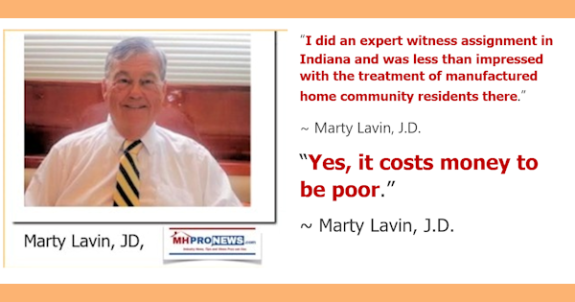
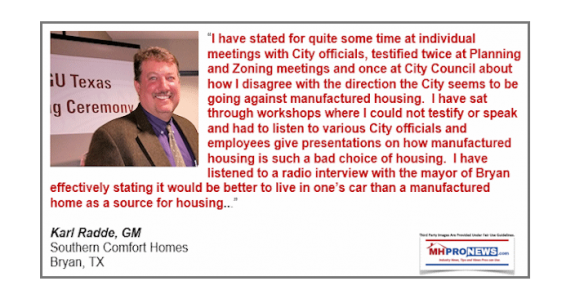
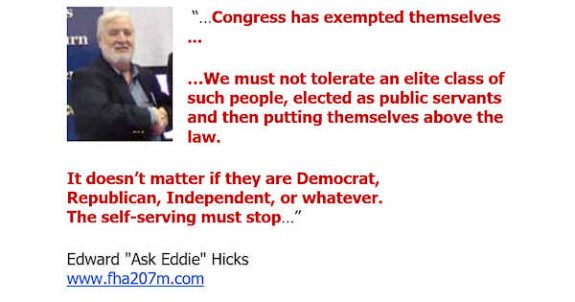
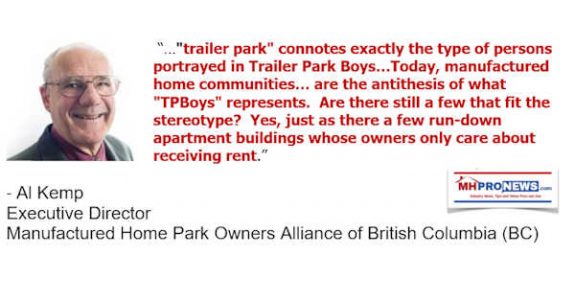
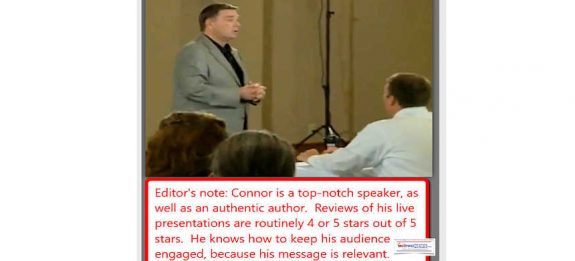
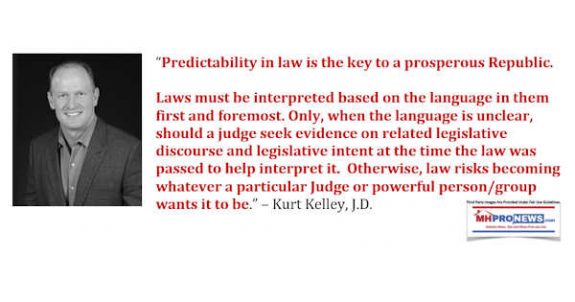
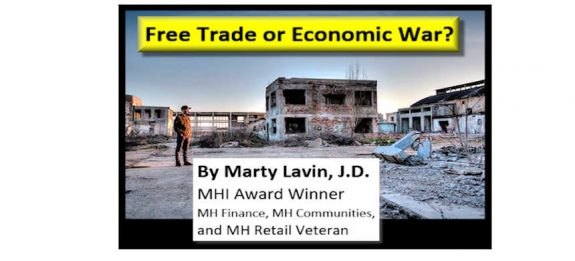
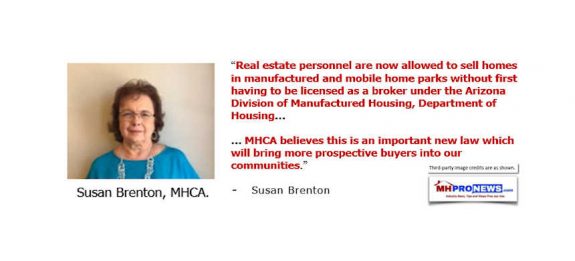
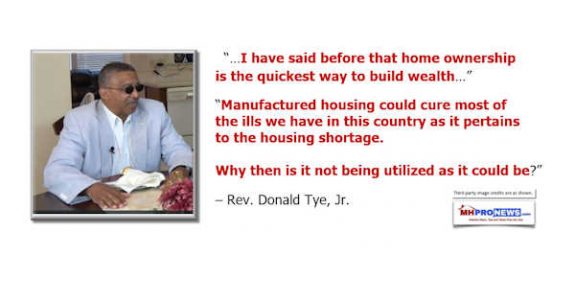
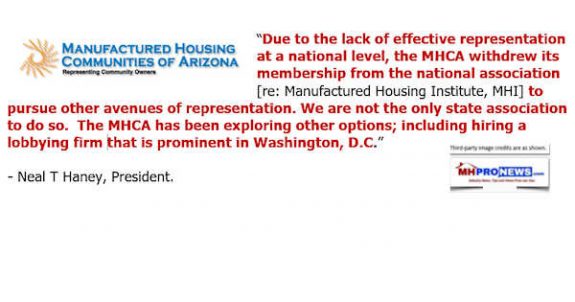
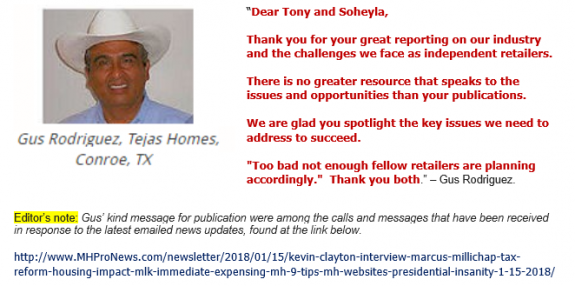
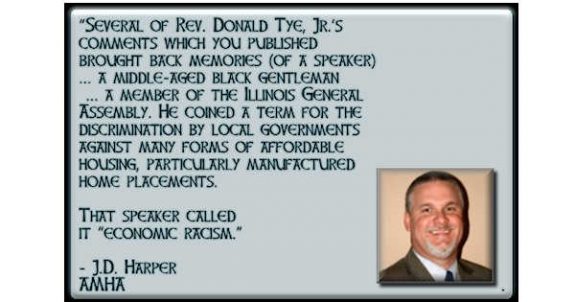
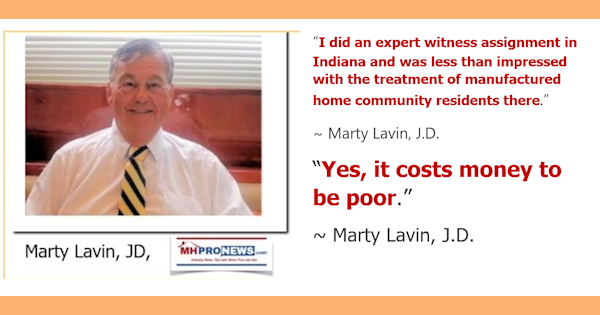
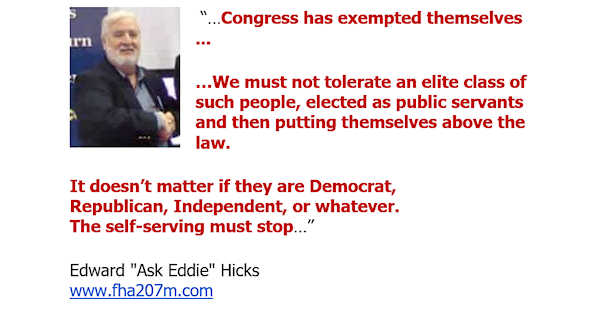
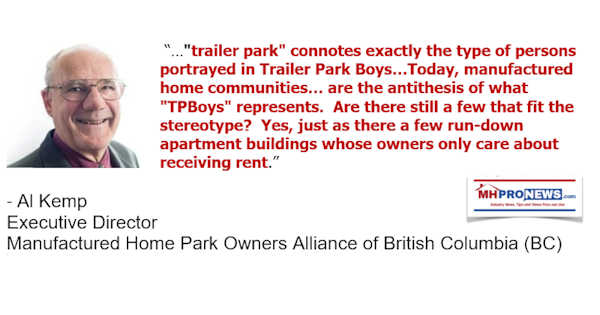
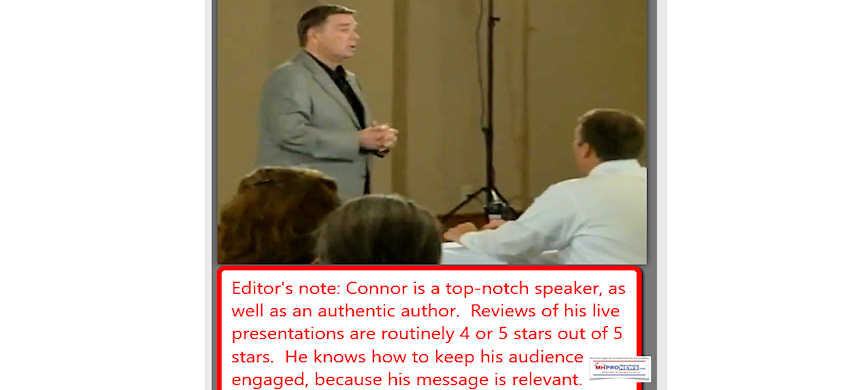
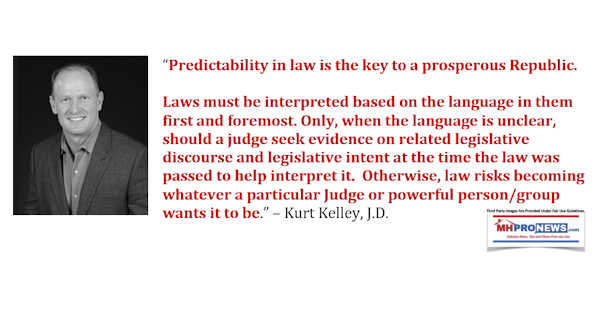
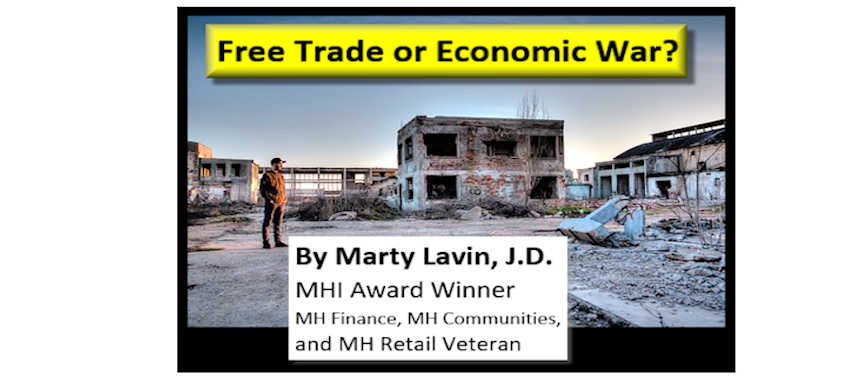
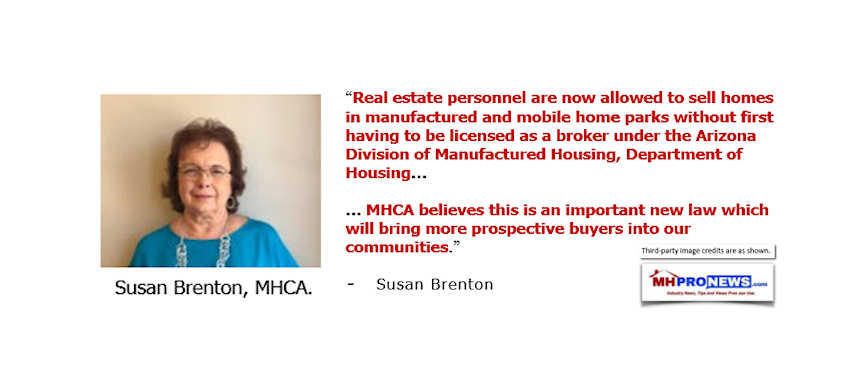
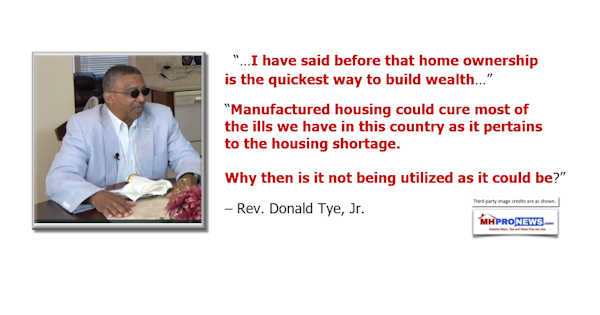
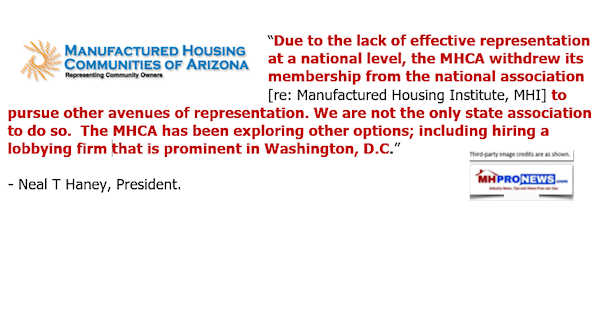
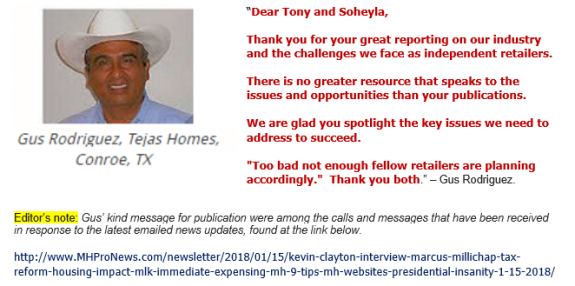
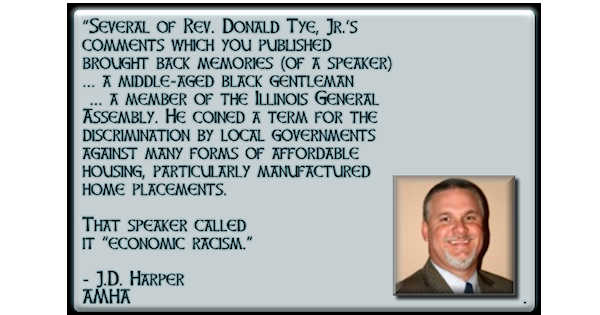
Karl Radde – TMHA, MHI, Southern Comfort Homes – Addressing Bryan City Leaders, Letter on Proposed Manufactured Home Ban
To All Concerned [Bryan City Officials, Others]: As the retail location referenced by Mr. Inderman, I would like to take a moment to address the …